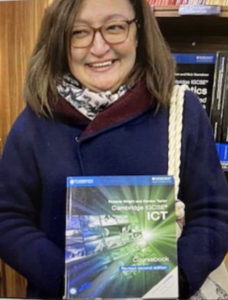Kulvir Bahra, a graduate of our Masters in Online and Distance Education, tells us what his study and graduation have meant for his career and the roles he has taken on.

Kulvir’s graduation
Kulvir writes:
I studied on the MAODE qualification from 2015-2020 and attended my OU graduation in 2022 at the Symphony Hall in Birmingham.
The study experience stretched me in many ways and I was able to apply my new found knowledge quite rapidly into the specialist fields of Learning Design and course production.
As a learning designer at Coventry University Online I was able to use my skills gained from studying H817 ‘Openness and Innovations in e-Learning’ by using a group project as the theoretical building blocks to assist academics in scoping and storyboarding the postgraduate module content.
Since then I was fortunate to work as a learning design officer at Warwick Business School and carried out student workload analysis across a range of modules in global banking qualifications and distance learning MBA modules. This was an important piece of work as this allowed the students to organise their study schedules around their work and family commitments.
More recently having been an OU student, this has enabled me to understand more about seeing the learning materials from the students perspective, which allowed me to understand the learners journey and help inform my practice in future new course productions. From this I was able to guide faculty teams around technical issues around accessing content from library services. One of the key takeaways that I took forward was to ensure that learners were not overwhelmed with too many assimilative based learning materials as this would be disengaging. Being a student myself enabled me to see the online learning materials as the ‘gold standard’ of what good looked like at postgraduate level of study, which helped me to benchmark best practice and to ensure the learning materials were rigorous and of the highest standards.
My final module H819 prepared me for writing my first research paper by honing in on my skills in researching and writing a literature review. By having the opportunity to be guided step-by-step and into how to carry out my research from keyword searches and forming my research questions to planning the methods and dissemination of my findings, this gave me an immense sense of achievement towards leading and co-publishing a research paper which was published earlier in 2023 with the US based research journal First Monday.
Overall, I believe that my study at the OU enabled me to inspire my family as my eldest child plans to go to university having observed the positive effects OU study had on my career progression. One of the many positive outcomes of studying at the OU was that I gained a promotion 2-3 years into beginning my qualification. This boosted my confidence immensely and gave me a competitive edge when I was applying for my first role.
But after graduating, my study never stopped there, as I continued to pursue more learning opportunities, from badged open courses on OpenLearn, a range of FutureLearn and Coursera courses, to a range of editorial courses which helped sharpen my skills in proofreading, copy editing and skills gained in collating references and citations. I am indebted to the network of students whom I studied with which helped me to progress and become a proud ambassador for the OU IET MAODE alumni community. Currently I work as a Digital Development Manager in the Stakeholder and Alumni Engagement team in the Faculty of Business and Law looking after the digital strands of the web estate by monitoring and evaluating websites across the business and law schools at the OU.
Interested in finding out more about The Open University’s Masters in Online Teaching?
In 2023 we launched the OU’s new Masters in Online Teaching, an innovative postgraduate programme exploring the ways that new media, digital pedagogies and cutting-edge educational technologies can be used effectively and equitably, across multiple sectors, to engage diverse learners and meet their needs. The programme offers flexible study pathways featuring a choice of topics, study intensity and study timing, and the option to include credit from a select postgraduate microcredentials.
Find out more about the OU’s MA In Online Teaching here.

